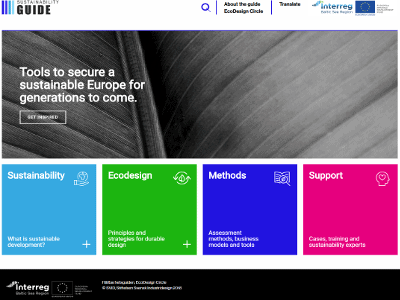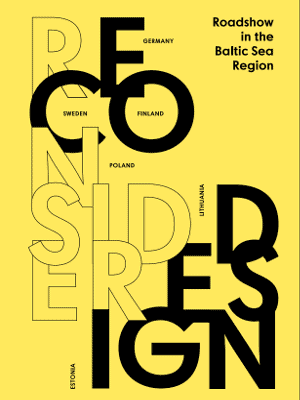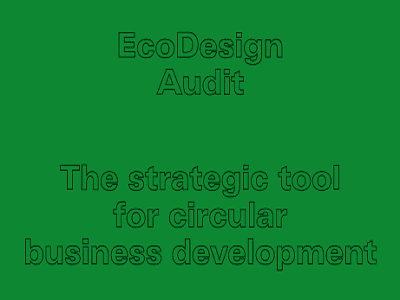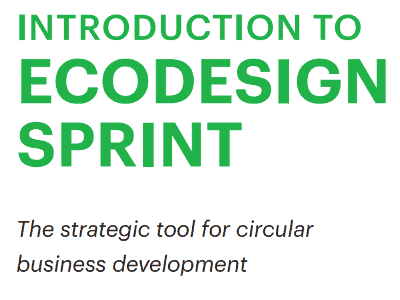EcoDesign Circle
Eco-design is design for a circular economy
Eco-design is one way to move our societies towards a circular economy. An eco-designed product is designed in a way that it lasts long, can be easily repaired and at the end of its life, it can be rapidly disassembled and its materials can be managed through existing recycling systems without leaving behind harmful waste. Eco-design items of today are by and large non-technological, often mass products for everyday life, e.g. plates, pillows, clothes or benches.
Eco-design knowledge needs to be translated into business reality
Until recently, eco-design was only sparsely applied. Small and medium sized enterprises are focused on traditional linear business models in which products are short-lived and materials are typically discarded as waste. However, know-how concerning the environmental impact of products, how to assess the impact and how to reduce it is available. The challenge is to translate environmental science into business reality.
Professional networks for design can make the difference
Design centres from five countries around the Baltic Sea got together with environmental scientists to expand their eco-design expertise and to promote the use of eco-design among their national networks of design companies. Design centres are typically non-profit networks or associations for design professionals. Most design centres lacked the instruments to support their affiliate companies in eco designing innovative products. The design centres’ primary aim was to introduce and expand the use of eco-design among designers and bring it into the core operations of companies.
Budgets
in numbers
-
2.01MillionTotal
-
1.54MillionErdf
-
0.00MillionEni + Russia
-
0.00MillionNorway
Achievements
Design Centers developed tools and broadened their offers
By collaborating with environmental scientists, the design centres of Germany, Sweden, Finland, Estonia and Poland gained in depth knowledge of eco-design. Together they conceptionalised a splendid travelling exhibition on ecodesign for major design events that reached more than 20.000 visitors in six countries. Together they compiled material for an online training platform, the sustainability guide, which is now publically available. And together they coached selected companies in identifying their opportunities in circular economy. Some of the design centres – e.g. in Estonia and Finland – established services developed in the Ecodesign Circle project as part of their regular offer and secured national funding to continue promoting eco-design.
Small and medium sized companies were propelled towards sustainability
Ecodesign Circle involved 26 selected companies from Estonia, Finland, Lithuania and Sweden to test the newly developed business development tools of eco-design audit and eco-design sprint. The companies ranged from manufacturers of leather bags, of bedding, and of outdoor travel equipment, to developers of packaging solutions and of outdoor furniture to a construction company. In the audit and sprint processes, international teams assessed the ongoing businesses, trained the companies in eco-design thinking based on the jointly compiled sustainability guide, delivered consultancy, guided the design of prototypes and helped the companies pilot new business concepts. The SMEs thus pro-actively explored the possibilities and business models of the circular economy. Five companies invested in total some EUR 300.000 into a transition towards circular economy, namely into creating the position of a sustainability manager, into exchanging materials and the location of production, into changing towards a renewable energy source, into prototyping and even into developing new, circular services.
Eco-design anchored among designers on the European level
Ecodesign Circle reached beyond the countries involved as it anchored eco-design in the Bureau of European Design Associations (BEDA). BEDA is a Brussels based non-profit organisation that represents designers from industrial design and interiors to digital design. Due to the Ecodesign Circle project, BEDA has embraced eco-design as a new thematic cluster, i.e. a transnational network designated to bundle knowhow and competences in the field of eco-design. Via the BEDA network, the Ecodesign Circle results can spread across Europe.
The follow-up project EcoDesign Circle 4.0 goes beyond products by targeting services for a circular economy (e.g. car-sharing) and spreads the knowledge gained in a train the trainer package. With EUR 1.54 million of support from the European Union, the Interreg project Ecodesign Circle made a great solution towards a greener Europe, ecodesign, common practice in design centers of five countries around the Baltic Sea.
Outputs
Sustainability guide for (eco-)design

Exhibition catalogue: Reconsider Design

Ecodesign Audit

EcoDesign Sprint

Project Stories
-
02.03.2021
5 questions to EcoDesign Circle: RegioStars finalist 2020
One of our Interreg Baltic Sea Region projects, EcoDesign Circle, reached the finals of the RegioStars Awards last year in the category of circular economy. What did the process look like? What did the project like most? And, most importantly, what was the gain for the project? Read the interview below.Read full story -
30.09.2020
Great project pictures that tell great Interreg stories!
More than seventy pictures competed in the Interreg Baltic Sea Region photo competition. Which projects were the best in illustrating transnational cooperation, grasping the essence of a project and its result, and presenting the 30th anniversary of Interreg? Congratulations to the teams of BalticRIM, RESQU2, Baltic Game Industry, EcoDesign Circle and GoSmart BSR!Read full story -
23.09.2020
Interreg projects from the region gain EU wide visibility
Two Interreg Baltic Sea Region projects - EcoDesign Circle and NonHazCity - have reached the finals of two EU wide campaigns: RegioStars Awards 2020 and the Interact Project Slam. Both projects showcase how cooperation in an Interreg project actively contributes to a greener Europe.Read full story -
04.12.2019
What Russian partners do in Interreg projects: 5 examples from the Baltic Sea region
As many as 43 Interreg Baltic Sea Region projects are working together with Russian partners, showcasing that the same cause unites people beyond borders. From innovating businesses to saving energy and improving mobility – Russian partners are active in all thematic fields of the Programme. But what do they actually do?Read full story -
13.10.2021
Making circular production a reality in the Baltic Sea region and beyond
80 % of the environmental impact of a product is determined during the design phase. This means that key decisions for a circular model of production are taken during this early stage. It is thus fundamental to act as early as possible to create products with a sustainable lifecycle which minimise waste. This is what our #MadeWithInterreg project EcoDesign Circle did by bringing together design centres, professionals, companies, and lecturers from eight countries in the Baltic Sea Region to increase their understanding of and capacities in ecodesign.Read full story -
06.12.2021
Showing Europe how ecodesign greens our economy
Reducing waste and ensuring sustainable use of our natural resources can’t be done by one country alone. We need more effective transnational solutions like the two successful examples from the Baltic Sea region and Central Europe show.Read full story -
20.12.2016
Eco-design products to minimise negative environmental impact
Design centres in the Baltic Sea Region have teamed up to turn their region into a forerunner for eco-design – a design approach crucial to a circular economy. Interreg Baltic Sea Region recently approved EUR 2.3 million to support EcoDesign Circle, international cooperation project that wants to push forward the change towards green growth in the Baltic Sea Region.Read full story -
21.12.2016
Ecodesign on wheels - inspiring stories to reconsider design
Circular economy and ecodesign are all about smart, innovative and sustainable design solutions with minimal or no waste when a product is consumed. An exhibition set up jointly by design centres from around the Baltic Sea and the German Environment Agency showcases successful examples for ecodesign in order to inspire other designers and consumers. With this exhibition, the Interreg project EcoDesign Circle fosters European integration for a more competitive Europe.Read full story
Partners
German Environment Agency
- TownDessau-Roßlau
- RegionDessau-Roßlau, Kreisfreie Stadt
- CountryGermany
- RepresentativeConrad Dorer
- Phone
- E-Mail
- Web
International Design Center Berlin (IDZ)
- TownBerlin
- RegionBerlin
- CountryGermany
- RepresentativeJutta Brinkschulte
- Phone
- E-Mail
- Web
Estonian Design Centre
- TownTallinn
- RegionPõhja-Eesti
- CountryEstonia
- RepresentativeTiia Vihand
- Phone
- E-Mail
- Web
Finnish Society of Crafts and Design / Design Forum Finland
- TownHelsinki
- RegionHelsinki-Uusimaa
- CountryFinland
- RepresentativeAino Vepsäläinen
- Phone
- E-Mail
- Web
SVID, Swedish Industrial Design Foundation
- TownStockholm
- RegionStockholms län
- CountrySweden
- RepresentativeAnna Velander-Gisslen
- Phone
- E-Mail
- Web
Pomeranian Science and Technology Park Gdynia
- TownGdynia
- RegionTrójmiejski
- CountryPoland
- RepresentativeMalwina Studzinska
- Phone
- E-Mail
- Web
-
Project managerConrad DorerGerman Environment Agency
-
Legal representativeEvelyn HagenahGerman Environment Agency
-
Financial managerAndrea RakersUmweltbundesamt
-
Communication managerCarsten Beyers.Pro - sustainable projects GmbH



